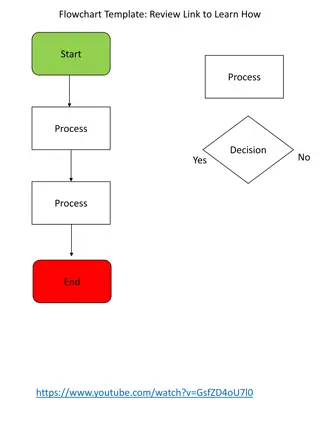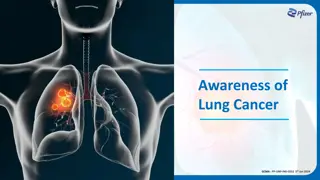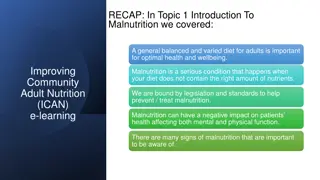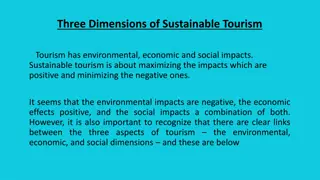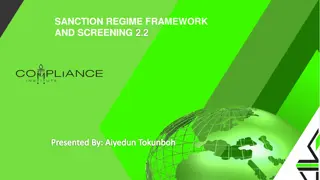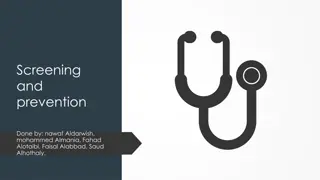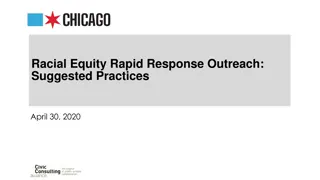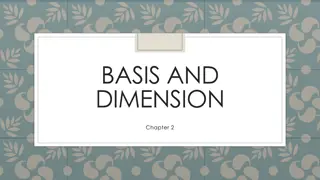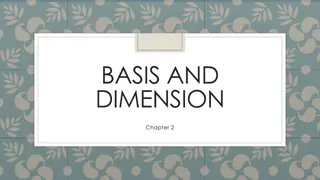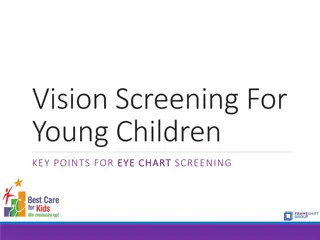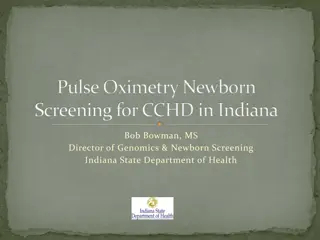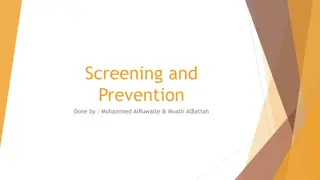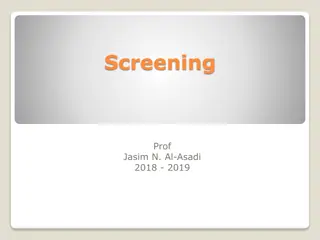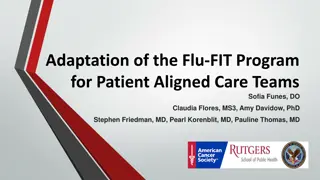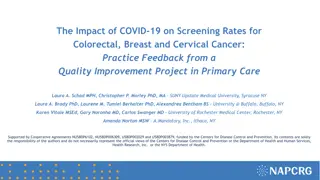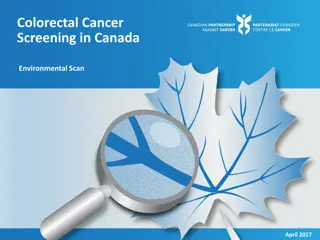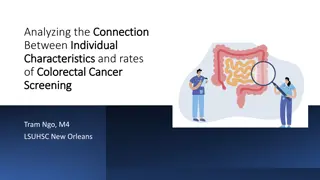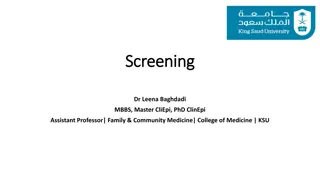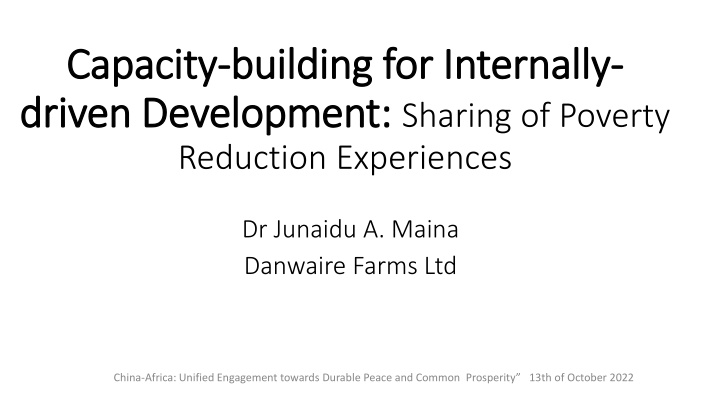
Variable Screening and Dimension Reduction in Model Development
Utilizing the Principle of Parsimony, variable screening is performed through univariate examination of main effects to analyze data and identify significant predictors. The process involves frequency tables, t-tests, correlation analysis, and Hoeffding's D test to explore relationships among variables and determine associations. Different correlation methods such as Pearson and Spearman are employed to assess linearity and rank correlations, respectively.
Download Presentation

Please find below an Image/Link to download the presentation.
The content on the website is provided AS IS for your information and personal use only. It may not be sold, licensed, or shared on other websites without obtaining consent from the author. If you encounter any issues during the download, it is possible that the publisher has removed the file from their server.
You are allowed to download the files provided on this website for personal or commercial use, subject to the condition that they are used lawfully. All files are the property of their respective owners.
The content on the website is provided AS IS for your information and personal use only. It may not be sold, licensed, or shared on other websites without obtaining consent from the author.
E N D
Presentation Transcript
Capacity Capacity- -building for Internally building for Internally- - driven Development: driven Development: Sharing of Poverty Reduction Experiences Dr Junaidu A. Maina Danwaire Farms Ltd China-Africa: Unified Engagement towards Durable Peace and Common Prosperity 13th of October 2022
Introduction According to National Bureau of Statistics (2018-19 household survey) 40% Nigeria s population or 83m live at or below the poverty line, The national poverty line was established at <N137,430.00 Majority of poor are in Rural areas with Urban areas faring better. That majority of the poor live in large families, with only around 18 percent living in households of four or less. Access to education is an important factor in poverty outcomes, with poverty concentrated in households with primary education or less. And concluded that Majority of the poor work in agriculture and farm related businesses.
Poverty Reduction Projects North-South Cooperation has been the traditional model for catalyzing agricultural development. South-South and Triangular Cooperation (SSC) was introduced to complement that model. SSC is partnerships between two or more developing countries in collaboration with a third partner, typically a developed/ donor/emerging economy and/or multilateral organization
FAO promoted South-South and Triangular Cooperation (SSC) Objective of SSC was to overcome common challenges and achieve food security, poverty reduction and the sustainable management of natural resources. SSC 4 Pillars 1. Facilitate the exchange and uptake of development solutions 2. Promote platforms for knowledge networking 3. Mobilize upstream policy support 4. Foster an enabling environment for partnerships and strategic alliances and mobilization of adequate and sustainable resources. SSC was based on a concept of Host country, Provider Country and FAO. Nigeria keyed into SSC as Host country and China as Provider
Nigeria-China, South-South Cooperation Project Nigeria committed $500m, China provided experts and technology with FAO as facilitator. 1st Phase (2003-2007) focused on; Forestry, aquaculture, horticulture, animal husbandry and crop production. Main achievements were; Rice-Fish-Culture (cage culture technology), Poultry- increase in vitamin content of eggs and Beekeeping. 2nd Phase (2009-2015);Demand driven with individual States requesting for specific types of Agric support in areas of strengthening capacities of farmers, processors, farm managers and extension staff. Main achievements were consolidating achievement of 1st Phase increased SSP capacity building in various aspects of Agriculture constructions of small earth dams for irrigations
Skill gaps and Capacity building for internally driven development for SSPs Addressing skill gaps for advancement of internally driven poverty reduction. 1. Climate change (CC) & Climate-smart agriculture (CSA). SSPs understand the effect of CC on their farms by experiencing declining soil fertility, poor yields, changes in rainfall pattern with increased frequency of flooding etc. understanding the concept of climate-smart agriculture. introduction of climate-smart technologies to compliment indigenous knowledge . sustainable land use and climate-smart agriculture (livestock, fisheries and forestry) 2. Improved Livestock husbandry methods: chicken, small ruminants and pigs are inflation free money safe boxes for SSPs (Piggy Bank). Rearing livestock the only viable dry season agricultural activities in areas where no water bodies exist. developing small holder business models mitigation against diseases and CC induced conflicts. promoting crop/livestock enterprises FAO defined Climate-smart agriculture (CSA) as an approach that helps guide actions to transform agri-food systems towards green and climate resilient practices
Skill gaps and Capacity building for internally driven development for SSPs cont d 3. Post harvest and processing good agricultural practices & reduction in post harvest wastages maintaining quality standards and Public health regulations in processing understanding exports standards for premium prices. organic agriculture 4. Farmer organisation and Financial management formation of producer associations/cooperatives negotiation skill for better prices from aggregators, middlemen etc how to access funds from banks and financial institutions for small scale operations etc
Skill gaps and Capacity building for internally driven development for SSPs cont d 5. Agri-entrepreneurs and exporters; in supply chain, SSPs produce small quantities, sell to aggregators who sell to big markets/exporters. understanding the peculiarities of export markets. guidance in appropriate applications of agro pesticides etc maintenance of export standards how private agri-businesses are adapting to climate change (e.g. seed supply, technologies, supply chain management etc) 6. Gender mainstreaming; women play critical roles in all agricultural production, processing and family nutrition. inclusive governance women voice in decision making (commodities processing, storage, pricing etc) general home management adult literacy

